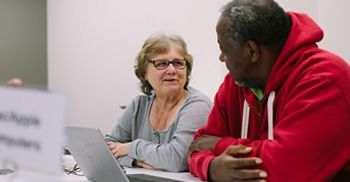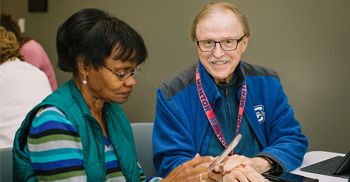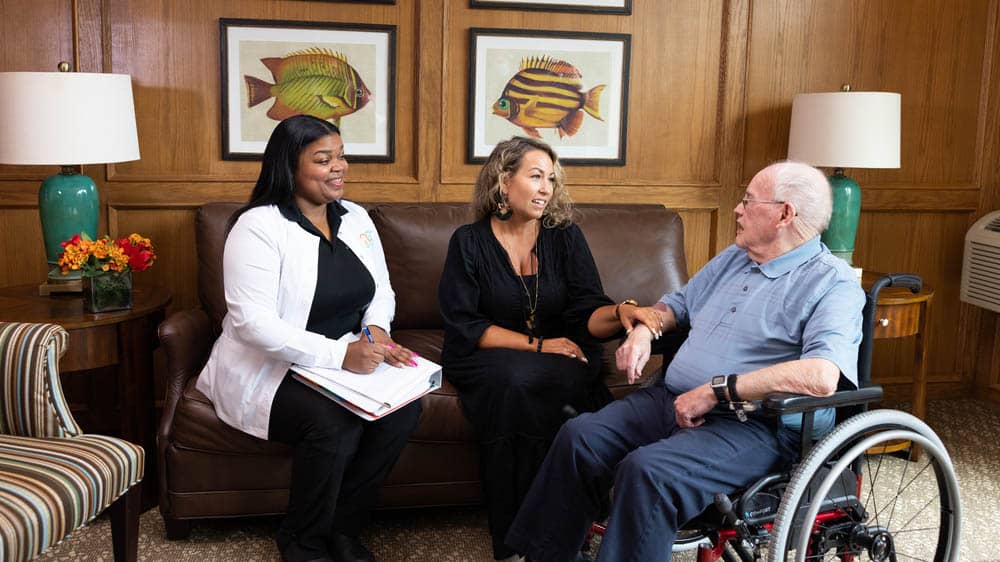

Data Privacy Tips for Senior Loved Ones
The news headlines these days seem to be filled with cybersecurity breaches at all levels — from government, to banks, to large department stores, digital data seems to be constantly compromised, as the majority of Americans have an online presence.
However, there are some who aren’t online. The Pew Research Center reports that 11 percent of the American population has no online presence. About a third of those non-internet users claim that the internet is simply too difficult to use, including 8 percent who said they were “too old to learn.” The volunteers and participants in the Cyber Seniors program at Do Space in Omaha, Nebraska, however, would probably disagree.
“Do Space provides free access to technology for the entire community,” says Weston Thomson, Director of Community Learning for Do Space. “We want people to utilize technology to become empowered to do more in their everyday lives. Our Cyber Seniors program gives seniors the opportunity to come and learn about technology from their peers, lowering the intimidation factor and helping them realize they can do it.”

Technological education, however, comes with great responsibility. Once seniors have a better grasp on how to navigate their computers, smartphones, email and internet, they also have to become savvy about online safety when it comes to protecting their data. In honor of Data Privacy Day on Monday, January 28, which was initiated as an international effort to create awareness about the importance of safeguarding online data, some of the Do Space Cyber Senior volunteers — Carl Fosco, Phill Sherbon, Steve Sidner and Chuck Williams — provided the following online security tips for seniors.
Get to Know Your Equipment
“Folks often come in with equipment they’ve received from relatives — usually their kids — that has already been set up,” says Fosco. “Even though these items were given as gifts, the gift giver isn’t able to take the time to really show their loved one how to use them. I would not advise seniors to get a computer or smartphone without having some idea of what they want to be able to do with it. Finding a friend, a mentor or a class that can help teach them how to use it would be better.”

“Using technology with insufficient knowledge about it is definitely one of the biggest vulnerabilities when it comes to online safety,” adds Thomson.
Be Careful Where You Surf
Sherbon advises that seniors should keep an eye on URL addresses, especially if they are doing anything online that would require the use of a credit card. “Make sure the URL address starts with ‘https’ instead of just ‘http,’” he says. “The ‘s’ stands for ‘secure’ so if the ‘s’ is missing, don’t put any financial information in — leave the site. If it is a secure site, there should also be a little lock icon in the URL bar to the left of the URL address. The padlock should be closed. If it’s open, don’t do any business on that site!”
“Before clicking any link, especially in email, hover over it with your mouse pointer,” says Sidner. “Once you do that, you’ll see a link appear in the lower left corner of the window, which will show you the web address where that link will ultimately take you. Is this what you expected? Do you recognize the domain name? When in doubt, do not click links in emails! The message may be a carefully crafted fake, using the same graphic design as well-known businesses, but the links go to other sites where thieves try to collect your personal information. This is called phishing — as in sticking a hook with bait in the water and seeing what you catch.”
Update Your Operating System Regularly
“Keep your computer operating system updated with the latest version, and keep your applications updated as well,” says Williams. “This is the only way developers can provide fixes for bugs that you experience within an application or operating system.”
If you have a computer that runs on Windows, Sidner suggests enabling automatic updates in your computer settings to ensure updates are made without you having to think about it. He also suggests enabling a Microsoft anti-malware program. “Either Windows Defender or Microsoft Security Essentials will be sufficient,” he says. “They come free with Windows 7 and Windows 10, and once you enable them, no other security software, such as McAfee or Norton, is necessary.”
Be Smart About Passwords
All of the volunteers recommend to have a password strategy, from not using the same password for different accounts, to changing your passwords regularly.
“Change passwords routinely — every few months,” says Williams. “If you can create a method to help you better remember passwords, then creating new passwords reduces the problem tenfold. As a computer coach/tutor for many years now, I spend about 80 percent of my time resetting passwords for my clients.”
“If you ever forget your passwords, just go to the websites where you need to log in, select ‘Forgot password’ on the login page and follow the instructions,” says Sidner.
If you’re really struggling with passwords, Thomson suggests using a password generation program that can come up with strong passwords for all of your login needs. “It’s also a matter of diligence,” he says. “Be sure to monitor all of your accounts regularly for strange activity and follow the news to stay on top of potential data breaches.”
Invest in Your Cyber Safety
You don’t have to live in Omaha to access some of the great technological resources that Do Space offers. Many community colleges, senior centers and local organizations offer classes that help older adults learn more about how to better use their technology. Once you get past the intimidation factor of learning something new, you might find that technology can be an amazing influence in your life.
“A bonus for seniors who are getting into tech now is how much more user-friendly computers and smartphones have become in the past few years,” says Thomson. “There’s nothing to be scared of, and increasing technology literacy is an important preventative step when it comes to safely surfing the internet.”







